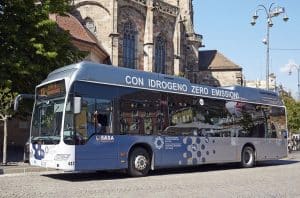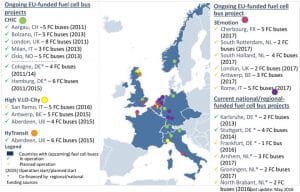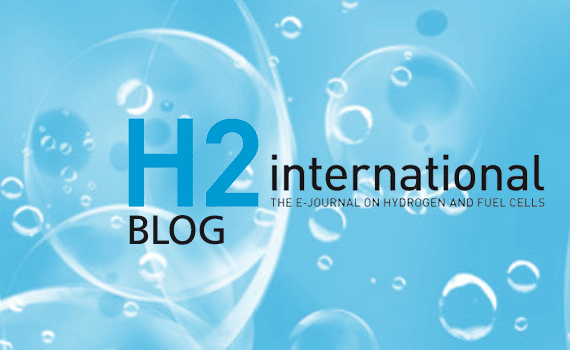An increasing number of German cities follow the example of Hamburg and stipulate the use of only zero-emission buses in public transportation starting in 2020 – Berlin’s senate among them. The transit authorities of the German state were instructed to purchase only buses without combustion engines from 2020 to ensure that the state government can meet federal and EU climate protection goals throughout the next decade.
Numerous transit authorities have shown interest in sustainable transportation, but the range of suitable product offerings has been somewhat limited. Berlin and Hamburg are now contemplating to create a purchasing association to prompt bus manufacturers to get more involved. If several transportation companies join forces and clearly state their requirements for low-emission vehicles, hopes are that demand will rise and unit prices fall.
In November 2014, five European bus manufacturers signed a corresponding memorandum of understanding, in which they announced the construction of between 500 and 1,000 fuel cell buses by 2020. Around 30 European cities and regions have expressed interest in their products. Back then, Hamburg’s First Mayor Olaf Scholz said: “The expressed aim is to have fuel cell buses in regular use by the end of this decade and have them become economically viable in public transportation as well.”
In Berlin, the situation doesn’t look as promising: The buses that ran on hydrogen were decommissioned years ago, and the latest utilization figures on the four electric units driving passengers of line 204 between Zoo Station and South Cross were between 70 and 80 percent.
Düsseldorf’s cleanup
Düsseldorf, however, intends to use vehicles such as hydrogen buses to exert more control over the city’s pollution levels. The Social Democrats in the city government are planning to have ten fuel cell buses on the road by 2018 – like the pioneers from Hamburg and their Innovation Line 106 (see HZwei issue from January 2015). In 2020 and beyond, only electric buses are to be purchased. The reason for the initiative by the head of the city’s Social Democratic Party, Andreas Rimkus, was that Rheinbahn had bought 80 diesel buses for EUR 18.5 million (EUR 231,000 apiece) in the Netherlands last fall, a move that prompted irritations in political circles.
Rimkus explained: “I believe that particularly vehicles with heavy city use, such as buses and commercial fleets, should be upgraded to receive zero-emission engines as soon as possible. Since Düsseldorf is one of several places which far exceed the threshold values for nitrous gases, I call for Rheinbahn to share in the available federal subsidy programs and advance toward zero-emission bus transport.”
Demand on the rise
Another transport company intending to go “green” in bus operation, albeit from 2030, is Cologne’s Regionalverkehr Köln. The four H2 buses that have already been in use at RVK are planned to be complemented by another 16 with fuel cell hybrid technology by 2020. Similarly, the public utility in Münster aims to buy another two fuel cell vehicles this summer, in addition to the five it is using now and which have so far run up 22,000 kilometers (13,670 miles).
The transport companies of Mainz, Frankfurt and Wiesbaden also plan to use hydrogen buses to reduce pollution and noise levels, but are waiting on a response by the EU about funding support. Their plans would lead to the purchase of eleven fuel cell buses (four in Mainz, four in Wiesbaden and three in Frankfurt) and the construction of a hydrogen filling station by 2018 if Brussels approves. H2Bus Rhein-Main is part of EU project Jive, the Joint Initiative for Hydrogen Vehicles across Europe, in which several other regions take part as well.
A question of costs
A fuel cell bus costs about twice or three times as much as its diesel equivalent. Rimkus: “Two years ago, a fuel cell bus still cost EUR 1.6 million; today, the figure is down to EUR 800,000.” The target is EUR 300,000 to 350,000 for a 12-meter (39-foot) vehicle.
The battery-electric bus used in Berlin, the Urbino 12 electric by Solaris, costs around EUR 700,000, as it contains an induction charging system which is still being tested.
Fuel cell buses in Europe
In late 2016, the mayor of London, Sadiq Khan, announced during the International Zero Emission Bus Conference and Summit (see Fuel Cell Buses Speed Ahead) that only emission-free models were to be selected from 2018 when buying single-decker buses for the inner city. And regarding the double-decker version, the acquisition of hybrid buses instead of diesel vehicles is planned for 2018 and beyond (see double-decker). London has long been a pioneer in this field: In early 2016, Transport for London signed a contract with Van Hool about the delivery of two hydrogen buses (type A330 with FCvelocity-HD7 module by Ballard).
Khan explained: “I want London to become a world leader in hydrogen and electric bus technology. I’m implementing hard-hitting measures to clean up London’s toxic air and it’s great that more cities are getting on board to phase out the procurement of pure diesel buses, which sends a clear signal that only the cleanest technologies are wanted in our cities.” The mayor of Copenhagen, Frank Jensen, added: “In Copenhagen, all new buses will be based on zero-emission and low-noise technologies from 2019.”
The governments of eleven big cities (Amsterdam, Cape Town, Copenhagen, Los Angeles, New York, San Francisco and others) responded to Khan’s call and have decided to stop purchasing diesel-only buses by the end of 2020. Madrid, Mexico-City and Paris assured that they will remove any diesel version from their cities by 2025. All in all, the number of fuel cell buses in use Europe-wide is said to increase to around 300 to 400 in the next years. South Tyrol alone intends to buy ten to fifteen new hydrogen buses after CHIC has run out. The state government has already approved the EUR 8.5 million needed for the project.
Activities abroad
Meanwhile, Japan is sparing no effort to prepare thoroughly for the 2020 Olympics. One hundred hydrogen-driven buses are thought to be running in Tokyo by then. The first two will reportedly be in use in early 2017. The buses, which are said to have the same fuel cell system as the Toyota Mirai, store fuel in ten high-pressure tanks adding up to 600 liters.
The situation is different in Switzerland, where transportation provider PostAuto is ending its fuel cell bus operation after a five-year test stage (see Fuel Cell Buses Speed Ahead). PostAuto has used five units from Mercedes-Benz in public transport since 2011, racking up 1.2 million kilometers or 745,645 miles in total. In 2013, the project received the Watt d’Or prize from the Swiss Federal Office of Energy in the category Energy-Efficient Mobility. The last of the five vehicles, however, is said to be decommissioned early this year.
“Currently, manufacturers lack the incentive to put fuel cell buses on the market.”
Heinrich Klingenberg, hySOLUTIONS, during the NIP conference




























we are interested to have your buses in SOUTH EAST ASIA